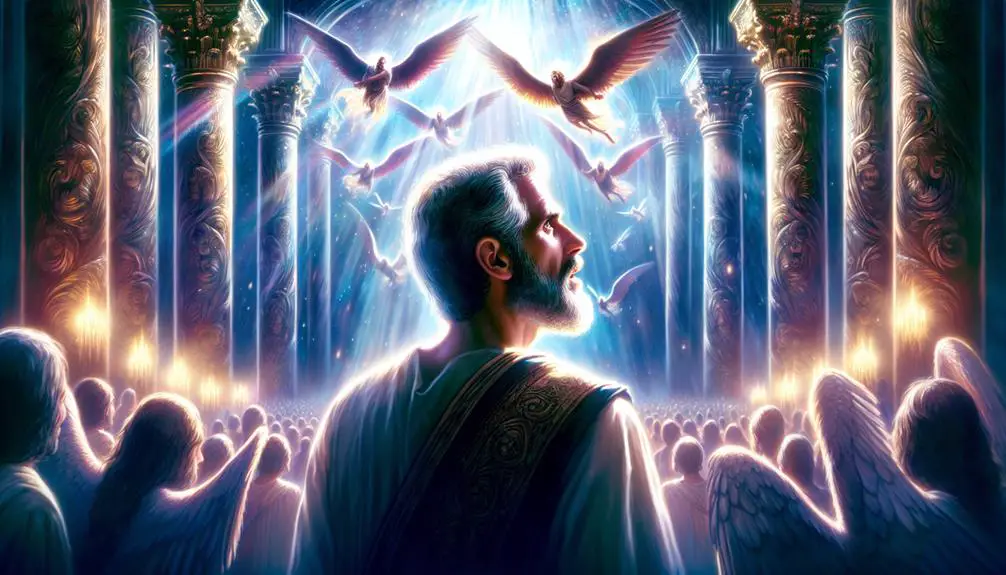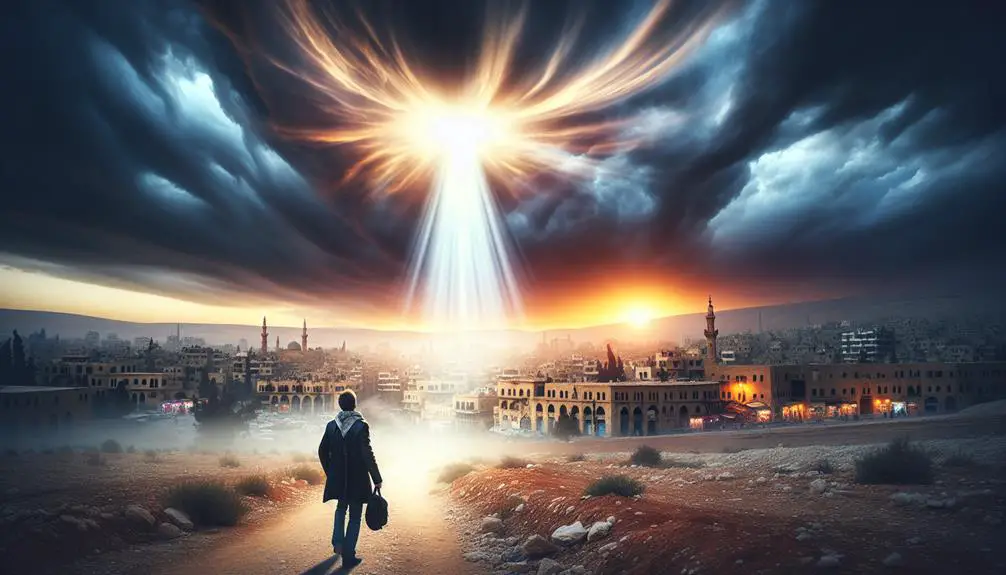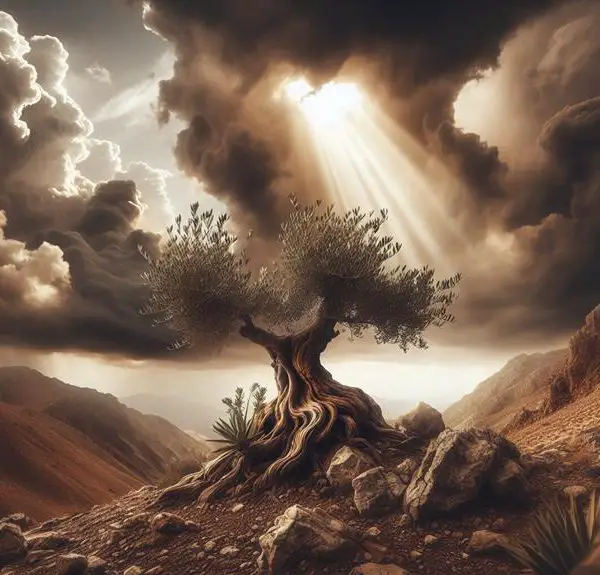Gain insight into divine encounters in the Bible, where ordinary moments transform into gateways for profound spiritual revelations.

Encounters With God in the Bible
Imagine standing before a bush engulfed in flames that never burn out, hearing a voice call your name. Throughout the Bible, you'll find moments where the divine breaches the ordinary, inviting humans into extraordinary encounters with God.
From Jacob wrestling at Peniel to Saul's transformative vision on the road to Damascus, these stories aren't just ancient texts; they're invitations to ponder the nature of divine-human interaction.
What can you learn from these encounters about faith, transformation, and purpose? Let's explore these questions together, discovering insights that remain as relevant today as they were millennia ago.
Key Takeaways
- Divine encounters often lead to significant personal transformation and spiritual growth.
- God communicates in various ways, including directly, through visions, or by symbolic acts.
- These encounters can come during moments of struggle or when seeking guidance.
- Following divine instructions often results in renewal and a deeper covenant relationship with God.
The Burning Bush Encounter

In the biblical narrative, Moses' encounter with the burning bush stands as a pivotal moment of divine revelation, illustrating a profound communication between God and man. This episode isn't merely a historical or mythological anecdote; it's a deeply symbolic event, rich with theological implications. At its core, the burning bush represents a miraculous sign, one that transcends ordinary natural laws. It's not the bush itself that's extraordinary, but the fact that it burns without being consumed. This paradox challenges Moses—and by extension, you, the reader—to reconsider the nature of the divine and the possible interactions between the supernatural and the mundane.
The event marks a spiritual awakening for Moses. It's his call to a higher purpose, signaling a transition from his past as a shepherd in Midian to his future as the liberator of the Israelites. You're invited to reflect on the symbolism of God choosing to reveal Himself in a desolate desert through a humble bush. It suggests that divine encounters can occur in the most unexpected places and through the most unassuming mediums.
Furthermore, God's self-identification as 'I am who I am' during this encounter emphasizes the idea of a God who's utterly transcendent yet immanently present in the world. It's a concept that challenges you to think about the divine as both beyond human comprehension and intimately involved in the world.
This narrative encourages a reflective consideration of your own moments of spiritual awakening. It invites you to look for the miraculous signs in your life that might lead you to a fuller understanding of your purpose and the divine presence in the world.
Jacob Wrestles at Peniel

You might find Jacob's nighttime encounter at Peniel intriguing, as it's layered with complex symbolism and divine interaction.
This wrestling match isn't just a physical struggle but signifies a deeper spiritual transformation, culminating in a new identity at dawn.
Reflecting on this pivotal moment, you'll uncover insights into the nature of human-divine engagements and the profound changes they can instigate.
Jacob's Nighttime Encounter
Amid the stillness of the night at Peniel, Jacob's encounter with a mysterious figure not only signifies a profound spiritual wrestling but also marks a pivotal transformation in his life's journey. This intense engagement, often interpreted through dream interpretation, suggests an angelic presence, guiding us to understand:
- Transformation: The struggle symbolizes Jacob's transition from a mere mortal to a figure of immense spiritual significance.
- Divine Encounter: The angelic presence hints at a direct communication with the divine, emphasizing the thin veil between the earthly and the spiritual.
- Self-Realization: Jacob's confrontation serves as a metaphor for the internal battles one must face to achieve true understanding and fulfillment.
This narrative invites you to reflect on your own journey, considering how moments of struggle can lead to profound growth and enlightenment.
Wrestling's Divine Meaning
Reflecting further on Jacob's nighttime encounter at Peniel, it's crucial to explore the deeper, divine significance embedded within his wrestling match. This episode isn't merely a physical confrontation but symbolizes a profound spiritual struggle, a divine wrestling that transcends mere human understanding. It's a moment where heaven and earth, the human and the divine, intersect in a tangible, physical struggle, yet it's imbued with profound spiritual implications.
Jacob's encounter serves as a metaphor for the spiritual battles you may face in your own journey. Divine wrestling points to a transformative engagement with the divine, where struggles and challenges become the very means through which spiritual growth and deeper understanding are facilitated. This narrative invites you to reflect on the nature of your spiritual struggles and their role in your relationship with the divine.
Transformation at Dawn
As dawn broke over Peniel, Jacob's all-night struggle with a divine being culminated in both a physical and spiritual transformation, marking a pivotal moment in his life's journey. This encounter at the break of day didn't just alter his physical form; it reshaped his very essence.
The transformative power of this event can be distilled into three key insights:
- Morning prayers symbolize an invitation for divine intervention and guidance at the start of each new day.
- Dawn blessings signify the renewal of faith and the receipt of new strength to face life's challenges.
- The struggle until dawn reflects the perseverance required to achieve spiritual growth and understanding.
This episode teaches that encounters with the divine, especially during moments of vulnerability, can lead to profound personal transformation.
Isaiah's Vision in the Temple

As you explore Isaiah's vision in the temple, you encounter a profound moment of divine interaction that significantly alters his path.
The seraphim's purifying act, involving a live coal, symbolizes a deep cleansing and preparation for Isaiah's mission.
This episode culminates in the divine commission revealed to Isaiah, marking a pivotal point in his prophetic journey and in the broader narrative of biblical encounters with the divine.
Isaiah's Holy Encounter
Isaiah's vision in the temple stands as a profound spiritual encounter, revealing the transformative power of divine presence and calling. This moment isn't just a narrative; it's a multifaceted symbol of spiritual awakening and readiness to serve. Through this encounter, you understand that:
- Prophetic calling isn't merely about receiving messages from the divine; it embodies a total transformation of the self, aligning one's purpose with a higher will.
- Spiritual cleansing goes beyond mere ritual purification. It signifies a deeper, internal renovation that prepares one for divine service.
- Encountering the divine often precipitates a profound realization of one's own limitations and the vastness of the divine mission.
This narrative teaches you the value of humility, readiness, and transformation in the spiritual journey.
Seraphim's Purifying Act
In the heart of Isaiah's temple vision, a seraphim's purifying act emerges as a pivotal moment, symbolizing profound spiritual renewal and readiness for prophetic mission.
This moment isn't just about physical cleansing; it's steeped in the rich tapestry of angelic hierarchy and symbolic purification. You witness an encounter that transcends the mundane, where the seraphim, beings high within the celestial order, facilitate a transformative experience.
This act of purification with a live coal isn't merely ritualistic. It embodies the deep cleansing necessary for Isaiah to undertake his divine mandate. Here, the seraphim's role is critical, serving as divine intermediaries who enact God's sanctification process.
This scene underscores the necessity of spiritual purity before one can fully embrace and fulfill a prophetic calling, illustrating the intricate interplay between divine agency and human receptivity.
Divine Commission Revealed
Following the seraphim's purifying act, the narrative unfolds to reveal God's divine commission to Isaiah, marking a critical juncture in his prophetic journey. This moment is significant not merely for the task at hand but for the broader theological implications it holds concerning divine appointments and spiritual awakenings.
Through this encounter, we learn:
- Divine appointments often come after moments of purification and preparation, signifying readiness for the tasks ahead.
- Spiritual awakenings are deeply personal yet carry a universal message, demanding response and action.
- The acceptance of a divine commission is a transformative experience, reshaping one's identity and purpose in accordance with God's will.
This episode in Isaiah's life offers profound insights into how encounters with the divine shape and propel one's spiritual journey forward.
Elijah and the Still Small Voice

Elijah's encounter with the still small voice represents a profound moment of divine communication, contrasting vividly with the dramatic manifestations of God's presence earlier in his journey. This silent revelation marks a pivotal shift in the prophet's journey, suggesting that divine messages often come in the quiet moments, rather than the thunderous events. This narrative invites you to explore the significance of stillness and silence in understanding God's will.
The following table conveys a deeper meaning of this encounter:
Aspect |
Significance |
Reflection for the Audience |
|---|---|---|
Environment |
Cave on Mount Horeb |
Seek solitude to hear God's whispers |
Preceding Events |
Earthquake, wind, fire |
Divine presence isn't limited to grand displays |
Still Small Voice |
Gentle whisper |
God communicates in subtle, personal ways |
Elijah's Reaction |
Covers his face with his cloak |
Reverence and humility in divine presence |
Outcome |
Receives God's instructions |
Silence prepares us for our mission |
This encounter teaches you the value of quiet introspection in your spiritual journey. The dramatic does not always herald God's presence; sometimes, it's the whisper in your heart where you find profound truths. Elijah's experience underscores the importance of being receptive to the silent revelations that guide us towards our purpose. Reflect on how you can incorporate stillness into your life to discern the divine whispers amidst the noise of the world.
Jonah's Call and Rebellion

Jonah's call to Nineveh, met with immediate rebellion, starkly contrasts the conventional obedience expected of a prophet, inviting you to ponder the complexities of divine mandates and human will. This narrative isn't merely about disobedience; it's a profound exploration of fear, redemption, and the universality of God's mercy.
When you delve into Jonah's story, you encounter a man who, despite being a prophet, exhibits a deeply human side. His initial refusal to go to Nineveh isn't just about fear or prejudice; it's a reflection of the struggle between personal convictions and divine command. This tension culminates in the Seafarer's storm, a dramatic event that serves not only as a pivotal moment for Jonah but also as a metaphor for the turmoil disobedience can create in one's life.
Consider the following points to grasp the depth of Jonah's narrative:
- Nineveh's repentance symbolizes the potential for change within the most unlikely of places and individuals. It's a testament to the power of divine compassion and a challenge to our often limited understanding of mercy.
- The Seafarer's storm represents the chaos and destruction that can arise from ignoring one's divine calling. It's a reminder that our actions have consequences, not just for ourselves, but for those around us.
- Jonah's eventual obedience underscores the notion that it's never too late to correct one's path. His journey from rebellion to submission illustrates the transformative potential of encountering God, even in the midst of our reluctance.
Through Jonah's tale, you're invited to reflect on the nature of obedience, the scope of divine mercy, and the possibility of redemption, no matter how far one might stray.
Daniel in the Lion's Den

Delving into the story of Daniel in the Lion's Den, we encounter a profound testament to the power of faith and divine protection in the face of seemingly insurmountable odds. This narrative is not just a miraculous survival story but also a rich field for theological reflection, especially concerning lions' symbolism and the power of prayer.
Lions, throughout biblical texts, symbolize both ferocity and royalty. In Daniel's case, they represent the lethal consequences of steadfast faith in a world that often demands conformity to secular decrees over divine command. Yet, the very lions meant to devour Daniel become docile, embodying the transformative power of God's presence.
Prayer, in this account, isn't merely a routine or a plea for help; it's an act of defiance against earthly authority and a testament to Daniel's unshakeable trust in God. His commitment to prayer, even when it threatens his life, underscores its significance not just as communication with the divine but as a powerful act of faith.
Aspect |
Analysis |
|---|---|
Lions' Symbolism |
Represent both the peril faced by the faithful and the potential for God's intervention to transform danger into a demonstration of divine power. |
Prayer's Power |
Acts as both a personal communion with God and a revolutionary act, illustrating faith's capacity to alter one's circumstances drastically. |
Divine Protection |
Daniel's safety among the lions showcases the protective power of faith and God's direct intervention in the lives of the faithful. |
Faith's Testimony |
The event becomes a public testament to the power of faith, influencing the king and the kingdom's perception of God. |
Theological Reflection |
Invites contemplation on the nature of divine protection, the significance of prayer, and the role of faith in challenging circumstances. |
Daniel's story invites you to reflect on the depth of your faith and the power of your prayers, encouraging a trust in divine protection that transcends understanding.
Moses on Mount Sinai

Moses' encounter with God on Mount Sinai stands as a pivotal moment, revealing the profound covenantal relationship between the divine and His people through the giving of the Ten Commandments. This event isn't just a historical or theological milestone; it's a moment of profound renewal and deep instructional significance. You're invited to delve deeper into this narrative, uncovering its layers and understanding its implications for the covenantal relationship it underscores.
At the heart of this encounter are three key elements that convey a deeper meaning:
- Covenant Renewal: The event at Mount Sinai represents not just the giving of laws but a renewal of the covenant between God and His people. It's a reaffirmation of a promise, a recommitment to a sacred relationship that defines identity and purpose.
- Law's Giving: The laws handed down to Moses aren't merely rules but instructions for living in a way that honors the covenant. They're guidelines for building a society on justice, mercy, and reverence for the divine. This isn't just about adherence but about embodying principles that reflect the character of God.
- Divine Encounter: Moses' direct encounter with God emphasizes the personal and communal aspects of faith. It's a reminder that at the heart of covenantal faith is an encounter with the divine that transforms and calls for obedience, trust, and worship.
Understanding Moses' experience on Mount Sinai helps you grasp the multifaceted nature of God's relationship with His people. It's an event that speaks of law, covenant, and divine presence, inviting you to reflect on the significance of these elements in your own journey of faith.
Saul's Conversion on the Road to Damascus

Transitioning from the profound revelations at Mount Sinai, we now examine Saul's dramatic conversion on the road to Damascus, an event that radically transforms not only his life but also the trajectory of early Christianity. This encounter, unlike any before, marks a pivotal moment in biblical history, showcasing the power of visionary transformation.
You're journeying with Saul, a fervent persecutor of Christians, destined for Damascus with a mission to arrest followers of 'The Way.' Suddenly, a blinding light from heaven envelops you, halting Saul's journey. This divine intervention isn't merely a call to faith; it's a complete overhaul of identity and purpose.
In this moment of vulnerability, you hear a voice, 'Saul, Saul, why do you persecute me?' It's Jesus, identifying himself with his followers, challenging Saul's actions at their core. This encounter on the Damascus road isn't just about the miraculous; it's a profound dialogue that invites reflection on the nature of divine calling and transformation.
You witness Saul's response, a testament to the encounter's impact. Blinded physically, he gains spiritual insight, leading to his baptism and a new identity—Paul. This visionary transformation signifies a radical reorientation of life. Paul's subsequent mission to spread the gospel among Gentiles reshapes early Christianity, emphasizing inclusion and the universality of God's message.
Reflecting on Saul's conversion, you're invited to consider the transformative power of divine encounters. It challenges you to see beyond the physical, recognizing the potential for change and redemption. Saul's journey on the Damascus road serves as a compelling narrative of faith, renewal, and the expansive nature of God's grace, illustrating that profound change is possible, even for the most unlikely individuals.
Frequently Asked Questions
How Do Modern Theologians Reconcile Scientific Understanding With Miraculous Encounters With God in the Bible?
You're looking at how modern theologians mesh science with miracles, right?
They lean on quantum theology and evolutionary cosmology, frameworks that don't box God into human understanding.
They argue that the divine operates beyond our scientific laws, suggesting miracles aren't breaches of nature, but deeper expressions of it.
This approach allows them to view biblical encounters with God not as contradictions to science, but as mysteries aligning with a more profound cosmic order.
What Psychological Interpretations Exist for Biblical Characters Experiencing Divine Encounters?
In exploring psychological interpretations, you'll find dream analysis and neurological explanations fascinating. Analysts delve into the subconscious, suggesting that divine encounters may reflect inner conflicts or aspirations.
Neurologically, such experiences could be tied to brain function anomalies, providing a scientific lens to these narratives. This approach doesn't diminish the spiritual significance but enriches our understanding, blending ancient texts with modern psychology to reflect on the human condition's complexities.
How Have These Biblical Stories of Encounters With God Influenced Contemporary Religious Practices and Rituals?
You'll find that contemporary religious practices and rituals have been deeply influenced by ancient narratives. These stories have spurred ritual adaptation, shaping the way contemporary worship is conducted.
Reflecting on these influences, it's clear that traditions evolve, integrating historical elements with modern interpretations. This evolution ensures that the essence of these encounters remains relevant, providing a bridge between past experiences and present expressions of faith.
Analyzing this connection offers profound insights into religious continuity and change.
In What Ways Have Artists and Writers Depicted These Encounters With God Throughout History, and How Have These Interpretations Evolved?
Throughout history, artists and writers have depicted divine encounters with a rich tapestry of artistic symbolism, capturing the profound cultural impact of these narratives.
You'll find that their interpretations have evolved, reflecting societal shifts and advancing ideologies. Initially, these portrayals were literal, steeped in religious fervor.
Over time, they've become more abstract, emphasizing personal interpretation and the universal search for meaning, showcasing the dynamic nature of human creativity and belief.
How Do Different Denominations Within Christianity Interpret the Significance and Meaning of These Encounters With God Differently?
In exploring how different Christian denominations perceive divine encounters, it's fascinating to note that over 70% show interpretative diversity.
You'll find that each sect delves into the divine mystery uniquely, reflecting a rich tapestry of belief and tradition.
This isn't just about variations in rituals or doctrines but extends to profound reflections on the nature of divinity itself, showcasing an analytical and scholarly approach to understanding these pivotal spiritual experiences.
Conclusion
As you've journeyed through these biblical narratives, it's clear that encounters with the divine are multifaceted, serving as a mirror reflecting the complexity of human-divine interaction.
These moments, from the quiet whisper to the roaring lion, underscore a dialogue where faith and destiny intertwine.
Like a tapestry woven with threads of divine revelation and human response, these stories invite you to ponder the depth of your own faith journey, urging a reflective examination of where the divine might be speaking into your life.



Sign up